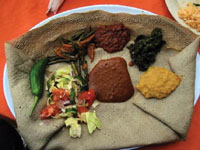29.6 PLHIV should maintain good nutrition
Maintaining a good nutritional status is essential for improving the quality of health of people presenting with any disease, including HIV and AIDS, as sick people have more nutritional needs than healthy ones. HIV infection by itself, in particular at the late stages of the disease, and/or the presence of opportunistic infections, have been associated with poor nutritional status and extreme weight loss. Poor nutrition in PLHIV may lead to further impairment in the function of an already damaged immune system and favour an increased incidence of opportunistic infections.
Other contributing factors to weight loss are the presence of diarrhoea and vomiting (common in patients with AIDS), which impair nutrient absorption through the gut, and loss of appetite, sometimes related to difficulties in eating. In addition, nausea and vomiting are common side-effects of ARV drugs, and may also play a role in the poor nutritional status observed in many PLHIV. You should advise PLHIV in your community to adhere to the following recommendations if they feel nauseated or they lose their appetite — eat small frequent meals, eat bland foods (e.g. porridge), do not eat oily or spicy foods, and take ARV drugs with or soon after meals.
Also remember that the nutritional requirement of people who are sick is greater than that of healthy people. This is because additional energy is needed to compensate for the increased energy needs of the body due to illness. PLHIV who are also coping with opportunistic or other infections will need to eat more nutritious food in order to help their immune system fight the infectious agents.
PLHIV, in particular those diagnosed with AIDS, should eat a well-balanced diet consisting of regular meals (even when they do not feel hungry). Meals should include protein, fat, carbohydrates and vitamins in the recommended proportions, as described in the Nutrition Module, and illustrated in Figure 29.4. In addition, a well-balanced diet involves drinking plenty of clean water, up to two litres per day. You should discuss with patients about how to incorporate a well-balanced diet into their life routines, and about factors such as lifestyle and economic status that may negatively affect it. If needed, suggest they ask for help when preparing meals and cooking. You may also need to refer patients to food support services at your nearest health centre.

29.5 PLHIV should work as their energy allows, and avoid stress
